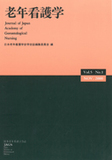Japanese
English
- 販売していません
- Abstract 文献概要
- 参考文献 Reference
本研究の目的は地域障害老人における「閉じこもり」と「閉じこめられ」の1年後の身体・心理社会的変化を明らかにすることである.1998年3〜7月に訪問面接を行った石川県輪島市の地域障害老人225人を対象に身体的,心理社会的特性について1年後に追跡調査を行った.その結果,以下の知見を得た.
1.「閉じこもり」は25.0%が死亡しており,5m歩行群の他の生活像の高齢者に比べ,死亡の割合が有意に高かった.
2.1年間のうちに「閉じこめられ」の介護者の負担感は有意に高くなり,「閉じこもり」は意欲が有意に下がっていた.
1年間の経過では在宅障害老人における「閉じこもり」は死亡しやすいこと,意欲が低下しやすいこと,「閉じこめられ」は介護者の負担感が増強しやすい生活像であることが明らかにされた.
A Japanese word Tojikomori is the elderly who are housebound-inactive but have enough mobility level. Tojikomerare is the elderly who are housebound-inactive elderly because of their low mobility. The purpose of the present study is to describe physical and psychosocial changes in one year of Tojikomori and Tojikomerare among community-dwelling disabled elderly.
The study design is a longitudinal study. Participants were 225 community-dwelling disabled elderly. Nurses conducted home interviews at Wajima City, Ishikawa Prefecture in Japan, in 1998 as baseline and 1999 as follow-up, and evaluated physical function and psychosocial characteristics of disabled elderly. Results obtained were as follows :
1. Among the elderly who were able to walk 5 yards, 25% of the Tojikomori had died. The mortality was significantly associated with Tojikomori.
2. During one year, the caregiving burden of Tojikomerare significantly had increased, and the autonomy of Tojikomori significantly had declined.
In one year, the physical and psychosocial changes among Tojikomori and Tojikomerare were specified.
Copyright © 2000, Japan Academy of Gerontological Nursing All rights reserved.


